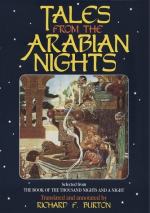Terminal Essay
Preliminary
The reader who has reached this terminal stage will hardly require my assurance that he has seen the mediaeval Arab at his best and, perhaps, at his worst. In glancing over the myriad pictures of this panorama, those who can discern the soul of goodness in things evil will note the true nobility of the Moslem’s mind in the Moyen Age, and the cleanliness of his life from cradle to grave. As a child he is devoted to his parents, fond of his comrades and respectful to his “pastors and masters,” even schoolmasters. As a lad he prepares for manhood with a will and this training occupies him throughout youthtide: he is a gentleman in manners without awkwardness, vulgar astonishment or mauvaise-honte. As a man he is high-spirited and energetic, always ready to fight for his Sultan, his country and, especially, his Faith: courteous and affable, rarely failing in temperance of mind and self-respect, self-control and self-command: hospitable to the stranger, attached to his fellow citizens, submissive to superiors and kindly to inferiors—if such classes exist: Eastern despotisms have arrived nearer the idea of equality and fraternity than any republic yet invented. As a friend he proves a model to the Damons and Pythiases: as a lover an exemplar to Don Quijote without the noble old Caballero’s touch of eccentricity. As a knight he is the mirror of chivalry, doing battle for the weak and debelling the strong, while ever “defending the honour of women.” As a husband his patriarchal position causes him to be loved and fondly loved by more than one wife: as a father affection for his children rules his life: he is domestic in the highest degree and he finds few pleasures beyond the bosom of his family. Lastly, his death is simple, pathetic end edifying as the life which led to it.
Considered in a higher phase, the mediaeval Moslem mind displays, like the ancient Egyptian, a most exalted moral idea, the deepest reverence for all things connected with his religion and a sublime conception of the Unity and Omnipotence of the Deity. Noteworthy too is a proud resignation to the decrees of Fate and Fortune (Kaza wa Kadar), of Destiny and Predestination—a feature which ennobles the low aspect of Al-Islam even in these her days of comparative degeneration and local decay. Hence his moderation in prosperity, his fortitude in adversity, his dignity, his perfect self-dominance and, lastly, his lofty quietism which sounds the true heroic ring. This again is softened and tempered by a simple faith in the supremacy of Love over Fear, an unbounded humanity and charity for the poor and helpless: an unconditional forgiveness of the direst injuries ("which is the note of the noble"); a generosity and liberality which at times seem impossible and an enthusiasm for universal benevolence and beneficence which, exalting kindly deeds done to man above every form of holiness, constitute the




